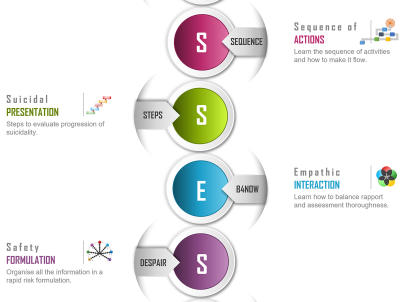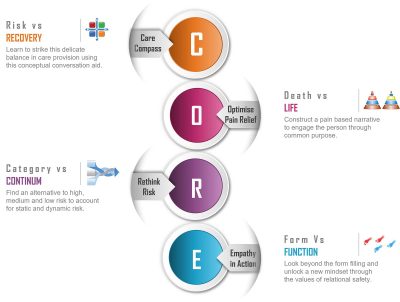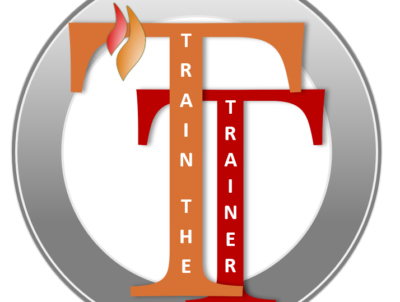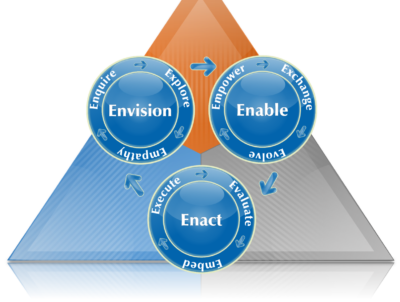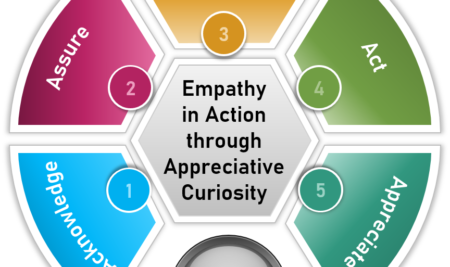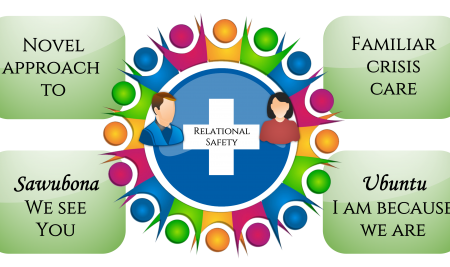
Suicide Prevention Training
PROTECT
PROactive deTECTion
PROTECT is an advanced suicide prevention training programme for mental health professionals. The primary learning objecting is to train in the art of coproducing relational safety, safety created within the scaffolding of a deeply therapeutic relationship between the person in distress, their natural circle of support and the professional. There are three modules with a number of units that operationalise the practice of collaborative suicide risk assessment and management.
Why PROTECT?
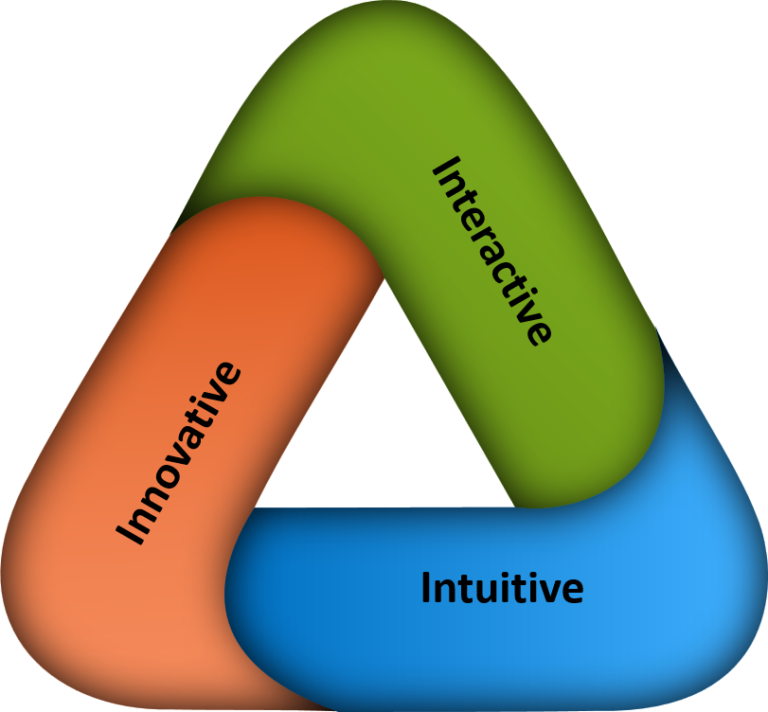
PROTECT is designed to inspire progress to the practice of supporting people in suicidal distress. It aspires to bring about a mindset shift, a step change through learning that is Innovative, Interactive and Intuitive.
Novel approaches:
- Care Concepts: new mindsets that underpin transformative care delivery
- Study Strategies: balance between theory and praxis translating latest research into better care – professional study aids
Adult Learning:
- Concepts to Case studies: building on prior knowledge through interactive and experiential learning
- Modular Mix and Match: shifting emphasis based on real time feedback from students
Simplifying Complexity
- Sequence and Structure: meaningful acronyms makes it easier to remember and apply in stressful situations
- Checks and Balances: a range of reflective strategies are embedded in the course to allow for simple but effective reflection in the moment
What is on Offer?
Suicide is the thirteenth leading cause of death worldwide, with about 1 million deaths every year due to self-inflicted violence (BMJ Best Practice Guidelines, 2017). Globally, suicides account for 50% of all violent deaths in men and 71% in women (WHO Preventing Suicide 2014). For people on the frontline working with suicidal individuals, PROTECT provides a structured approach to mindfully manage ones thinking, feelings and responses that are needed to steer a person amidst intense suicidal distress towards safety. The skills, knowledge and competencies needed are captured in four frameworks, outlined below. The online courses / one, two or three day face to face workshop translates the latest research into practice and is applicable across all age groups and diagnostic categories. Experienced psychiatrists will get the opportunity to refresh their competencies and pick up new skills and concepts. Newcomers will gain a strong foundation to suicide risk management.
Why attend this course?
Without risk there is no recovery but there is a fine line to strike. Through a range of case studies and experiential training, workshop attendees will explore many innovative concepts. The scientific literature has been combined with contemporary practice from two successful initiatives from Cambridgeshire, UK; 333 – a recovery oriented model of inpatient/community crisis care (Kar Ray et al 2019) and PROMISE – a programme to reduce coercion in care by enhancing patient experience (Lombardo et al 2018). The resulting PROTECT (PROactive deTECTion) frameworks operationalise ongoing practice of relational safety in these initiatives. Deep empathy, relational safety, rational vs rationalising, despair map, risk response balance sheet, “1-2-7” and “creep – crash – crawl” to name a few. The knowledge and competencies needed are captured in three modules that make up PROTECT.
- CORE (Introductory Module): Lays the foundation of relational safety to balance risk vs recovery (Care Compass) and identifies the key shift in mindset
- ASSESS (Assessment Module): Provides comprehensive understanding of suicide phenomenology, the assessment process, clinical decisions (AWARE), formulation (DESPAIR) and documentation (NOTES)
- ASPIRE (Management Module): Provides in depth understanding of supporting the recovery journey from Safety Planning (SAFE & SOLVE) to Monitoring (Review Cycle) to Resilience building (VALUES) to working with family (LOVE & CARERS)
Learning Objectives
At the conclusion of the course the participant will:
- understand the factors that influence clinical decision making in the context of suicidal distress.
- be able to use a simple and effective post-assessment crosscheck tool to counter undue influences on their decision making.
- be able to engage suicidal patients in effective safety planning.
- be able to engage the person in creating a person centered care plan that draws on the person’s assets, strengths and natural circle of support
- be able to use a range of techniques from CBT and ACT that are relevant to ongoing monitoring and building resilience in people with suicidal distress.
- be able to document a meaningful risk formulation which can enhance safety and guide future treatment.
Latest Blog Posts
What's happening in the world of mental health
Appreciative Curiosity to Support the Mental Health Sequelae of COVID-19
Navigating Rocky Waters
The Lion Within
What is Happiness? A Journey Through Time
01 | Introduction to PROTECT: Novel Solutions to Suicide Risk Management
02 | Navigating Rocky Waters
Events
Upcoming Education Events that may interest you
Testimonials
What students said about courses they attended?

Intensive Simulation Training
The 7 SAFE Steps role plays initially were fairly intimidating, but as the day went this built up my confidence. Having real time feedback and learning from the demonstrations and the others in the group was invaluable. I now have a long list of things that I should do and not do.

Consultant Psychiatrist
“AWARE helped me think about my own attitudes that I hold towards people in suicidal distress and how that impacts my clinical decision making as well as the way in which I supervise my juniors.”

Clinical Nurse Specialist
“ 1-2-7 is a simple but effective tool, it will change the way in which I approach the safety planning discussion. It ha helped me think about safety in a broader way and all the resources that I can pull on to support a person in suicidal distress. Strongly recommend it to everyone.”

Psychologist
“ The speed dating session in which we practiced the pain relief conversation was a real eye opener. Just saying the same words 5 times to 5 different colleagues within 5 minutes pushed up my skill levels significantly – just feel more confident talking about a person’s psychological pain and calling it for what it is. ”

Peer Worker
“ I wanted to skip DESPAIR and wanted to jump to ASPIRE, but going through the whole course in a systematic way brought home the importance of doing a thorough assessment and gaining an understanding of risk – DESPAIR looks straight forward even for those with lived experience to think about risk while supporting someone who is feeling suicidal.”

Consultant Psychiatrist
“ Since I have been exposed to the PROTECT framework at WPA in Mexico, I can only think of it when it comes to teaching people about risk of suicide and self harm, it has been absolutely transformative for my clinical practice ”

Occupational Therapist
“ I found the educational sessions inspiring and it has rejuvenated me, striking the fine balance between risk and recovery is challenging and draining, but the care compass really makes it easy to conceptualize and talk through with a patient. ”
Subscribe now and receive newsletter with educational materials, new courses, interesting posts, popular books and much more!




